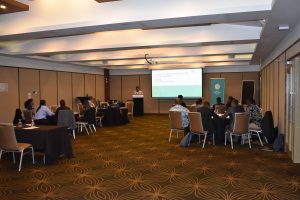

The Climate Change Act (CCA) 2021 is an ambitious and comprehensive legislation that creates the way forward to take Fiji to reach a bold net zero carbon emissions goal by 2050. As such, it sets solid ground for government, development partners and Civil Society Organizations (CSOs), to coordinate and work together efficiently towards net zero carbon emission goal. Under the Climate Change Act, all government entities have a mandate to support its implementation, including the Ministry of Economy (MOE) and the Fiji Bureau of Statistics (FBoS), who must embrace new responsibilities, as they will oversee and implement gathering and consolidating emissions data across different sectors.
 GGGI is assisting the Climate Change and International Cooperation Division (CCICD) at MOE and FBoS with the implementation of the Climate Change Act 2021 with funding from New Zealand´s Ministry of Foreign Affairs and Trade (MFAT), through a capacity building process which has been designed and implemented focusing on GHG data management and on ‘activity data’. The approach to design the training was based on a participatory assessment of gaps, and the design/conduction of a survey followed by consultations.
GGGI is assisting the Climate Change and International Cooperation Division (CCICD) at MOE and FBoS with the implementation of the Climate Change Act 2021 with funding from New Zealand´s Ministry of Foreign Affairs and Trade (MFAT), through a capacity building process which has been designed and implemented focusing on GHG data management and on ‘activity data’. The approach to design the training was based on a participatory assessment of gaps, and the design/conduction of a survey followed by consultations.
Hence, on March 9th and 10th, 2022, a capacity building workshop was undertaken in Suva, aimed at enhancing the understanding of modalities and procedures covering activity data collection, compilation and sharing of data and information. The intended use of this ´activity data´ is to prepare the national GHG inventory in alignment with the Fiji Climate Change Act 2021. The learning from the workshop will also assist in mainstreaming activity data use for relevant national reporting, as well as reporting under the Paris Agreement. This two-day face-to-face workshop covered a wide range of topics with overarching aspects on climate change generalities during Day 1, and a deep dive into data management during Day 2.
As such, fifteen (15) participants (comprised of seven –7- women, and eight –8-men) from MoE and FBoS, attended interactive sessions and learned about practical approaches in preparing GHG inventory and relevant activity data. These deep-dive sessions enhanced the participants’ understanding of modalities and procedures regarding data collection, compilation and the relevant requirements.
As a result, GGGI has co-created and documented with FBoS these training modules, along with a 3-year plan to enhance capacities overtime in a sustainable manner, targeting both onboarding and long-term staff. Also, GGGI will deliver standard operational procedure (SOE) which FBoS will adopt and implement moving forward, to systematically collect, compile and report based on international standards and best practices, such as the related guidelines of the IPCC (Intergovernmental Panel on Climate Change), in coordination with all relevant government stakeholders.
 As part of this training, the opening ceremony conveyed a broader audience of development partners and Civil Society Organizations that have been cooperating and working intensively around the many dimensions of the CCA, before and after it was adopted, ultimately to support joint and coordinated actions that may enable both mitigation and adaptation efforts to progress. MOE was able to take stock and address key questions related to the CCA, and converse with partners on the ground about key issues, such as, ¿What has specifically happened after it was adopted? ¿What comes next? ¿What are the government´s immediate plans and steps in terms of implementation? ¿Which are those ideas that make the most sense to boost collaboration and deliver efficient results?
As part of this training, the opening ceremony conveyed a broader audience of development partners and Civil Society Organizations that have been cooperating and working intensively around the many dimensions of the CCA, before and after it was adopted, ultimately to support joint and coordinated actions that may enable both mitigation and adaptation efforts to progress. MOE was able to take stock and address key questions related to the CCA, and converse with partners on the ground about key issues, such as, ¿What has specifically happened after it was adopted? ¿What comes next? ¿What are the government´s immediate plans and steps in terms of implementation? ¿Which are those ideas that make the most sense to boost collaboration and deliver efficient results?
About GGGI and the Low Emissions Climate Resilient Development (LECRD) program
The Global Green Growth Institute (GGGI) is a treaty-based international, inter-governmental organization dedicated to supporting and promoting strong, inclusive and sustainable economic growth in developing countries and emerging economies. In close collaboration with the Climate Change and International Cooperation Division (CCICD) of the Ministry of Economy and funding from New Zealand´s Ministry of Foreign Affairs (MFAT), GGGI is implementing Low Emissions Climate Resilient Development (LECRD) program in Pacific Islands Countries.
The LECRD program supports regional resilience and emissions reduction by working with Pacific Islands Countries to transition to inclusive, low emissions and climate resilient development. As such, it promotes multi-stakeholder and innovative LECRD programmatic approaches that will leverage existing Pacific experiences to support governments integrate mitigation and adaptation planning, policies, and actions across sectors and national, local and community levels and multiple sectors.